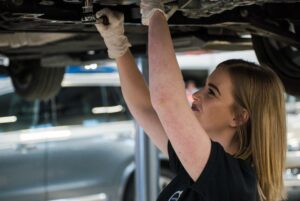
With female representation in the automotive sector hovering at just 19% compared to 51% in non-automotive industries new research reveals half of women surveyed say they would not consider a career in the motor industry.
A third said that it was never presented as an option to them by their family, school or college. More needs to be done at a societal level and across primary and tertiary education, says Venson, to encourage women into the automotive sector, including fleet, to make it more representative of the market it serves and to help plug the skills shortage.
More optimistically though, Venson’s research also reveals that 26% of women would or have considered a career in the motor industry while 24% remained uncertain. The most popular career choice for those considering the industry is to become a car designer (33%). This is followed by automotive application software engineer – responsible for the design and development of software systems for in-car technology (26%) – and vehicle technician – specialising in the computerised aspects of vehicle repair (24%).
Further good news is that 34% of women aged between 18 and 24 would consider a job in the automotive sector. The appeal, however, wanes for older age groups with just over a quarter (27%) of 25–34-year-old women saying they would think about it. Less than a quarter (23%) of 35–44-year-olds said they would contemplate a job in automotive.
Even with the positive response from the 18 to 24 year olds it is clear that more needs to be done to capture the younger age group at school and college level when they are choosing their career options.
Alison Bell, Operations Director for Venson, comments, “The automotive sector faces its biggest skills challenge of the last two decades, yet half of the women we surveyed said they would not consider a career in the motor industry as they believe they don’t have the technical abilities needed. The Institute of the Motor Industry reports that filling traditional posts, including vehicle technicians, tyre, exhaust and windscreen fitters is still a significant challenge, it is easy to see the knock-on effect on the fleet industry unless initiatives are taken to address the gender imbalance.
“Despite women reporting a lack of encouragement at school level and beyond, it’s reassuring to see from our research that a quarter of women still aspire to a career in the automotive industry. We can only imagine the upward trajectory if more was done to promote a career with cars to girls, from early years.
“It is fantastic to see the Association of Fleet Professionals this month holding a course on public speaking for women in fleet, as this will help get more female voices heard. As a sector though, we all need to play our part in promoting our chosen motor industry career paths to help demonstrate that they are attainable to all and that anyone can work in what is one of the world’s most exciting industries, concludes Bell.”
Read more:
50% of women say they would not consider working in the motor industry





